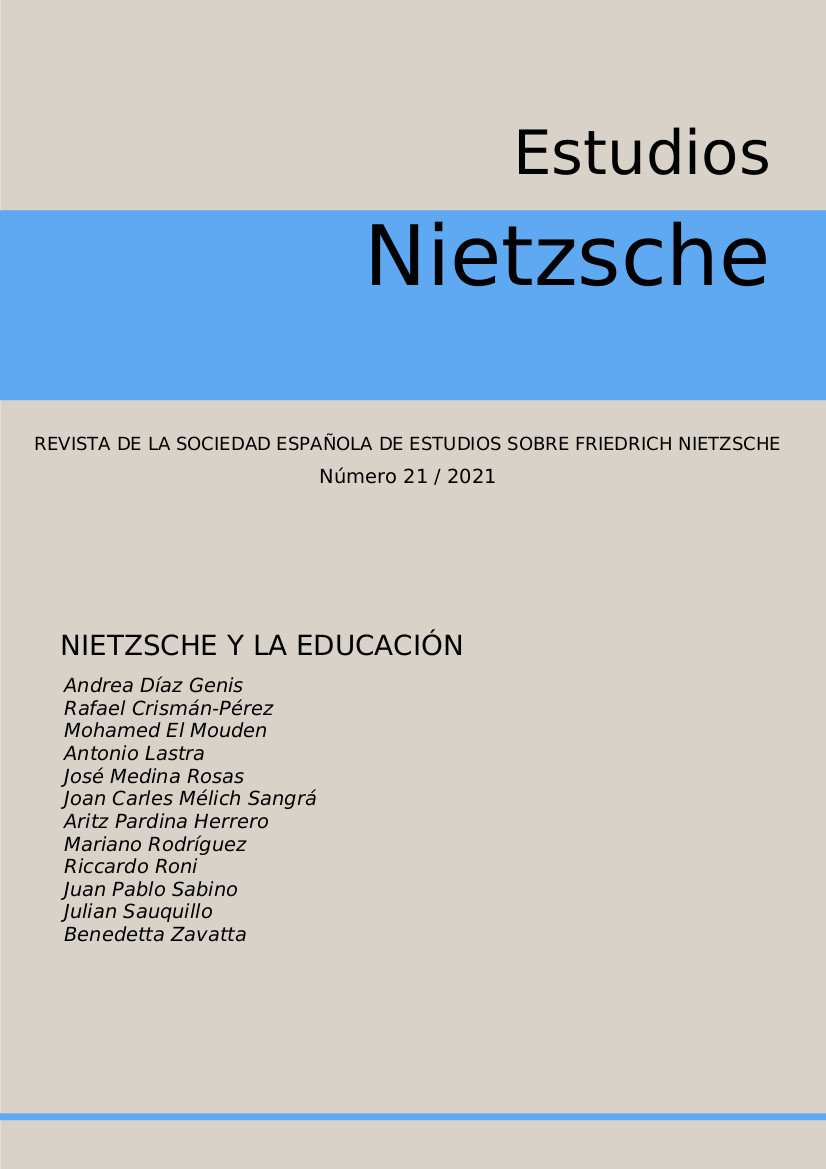Educating the “sick animal”. Nietzsche, the problem of greatness and the reconfiguration of intersubjectivity in the historical experience
DOI:
https://doi.org/10.24310/EstudiosNIETen.vi21.13715Keywords:
education, pragmatism, greatness, reasonAbstract
In this article I am focusing on the problem of greatness and on the social destiny of strong individuals in some moments of Nietzsche’s reflection, investigating the ethical-pedagogical implications of this assumption, without neglecting the importance of the historical experience. On this basis, I value Nietzsche’s attempt to reconfigure subjectivity and intersubjective relations through new models of coexistence (even in democratic contexts marked by decadence), by appealing to the human capacity for self-overcoming, in accordance with the demands of a “concrete reason” which makes explicit the multiple ways of being in the world.
Downloads
Metrics
References
A. Allen, «Awaiting education: Friedrich Nietzsche on the future of our educational institutions», en Philosophical Inquiry in Education, 24 (2017), pp. 197-210
A. Aviram, «Nietzsche as educator?», en Journal of Philosophy of Education, 25 (1991), pp. 219-234.
G. Campioni, Les lectures françaises de Nietzsche, París: PUF, 2001.
G. Canfarini, Nietzsche. Il pensiero in cammino, Roma: Viella, 2021
J. Dumonteil, Nietzsche et l’éducation. À l’école de l’antiquité, París: L’Harmattan, 2015.
C. Esposito, Il nichilismo del nostro tempo. Una cronaca, Roma: Carocci, 2021
M.C. Fornari, La morale evolutiva del gregge. Nietzsche legge Spencer e Mill, Pisa: Edizioni ETS, Pisa 2006
P. Gori, Il pragmatismo di Nietzsche. Saggi sul pensiero prospettivistico, Milano. Mimesis, 2016
K. Jenkins, «The dogma of Nietzsche’s Zarathustra», en Journal of Philosophy of Education, 16 (1982), pp. 251-254.
M. E. Jonas, D.W. Yacek, Nietzsche’s Philosophy of Education. Rethinking Ethics, Equality and the Good Life in a Democratic Age, New York: Routledge, 2019.
J.S. Johnston, «Nietzsche, education and democracy», en M.A. Peters, J.D. Marshall, P. Smeyers (Eds.), Nietzsche’s Legacy for Education: Past and Present Values, Westport: Bergin & Garvey, 2001, pp. 73-90
J. W. Hillesheim, «Nietzschean images of self-overcoming: response to Rosenow», en Educational Theory, 40 (1990), pp. 301-306.
W. Kaufmann, Nietzsche. Philosopher, Psychologist, Antichrist, Princeton: University Press, 1982
S. Moravia, L’esistenza ferita. Modi d’essere, sofferenze, terapie dell’uomo nell’inquietudine del mondo, Milano: Feltrinelli, 1999
F. Nietzsche. Fragmentos Póstumos vols. I-IV, ed. dirigida por Diego Sánchez Meca. Madrid: Tecnos, 2007-2010
F. Nietzsche. Correspondencia vols. I-VI, ed. dirigida por Luis Enrique de Santiago Guervós. Madrid: Trotta, 2005-2012
F. Nietzsche, Obras Completas, vols. I-IV, ed. dirigida por Diego Sánchez Meca, Madrid: Tecnos, 2011-2016.
E. Rosenow, «Nietzsche’s educational dynamite», en Educational Theory, 39 (1989), pp. 307-316
G. Ryle, Il concetto di mente, pref. de D. Dennett, trad. it. de G. Pellegrino, Torino: Einaudi, 200
Downloads
Published
How to Cite
Issue
Section
License
As of issue 21 (2021) this journal is published only in open access (diamond route).
From that number 21, like the previous numbers published in NIETZSCHE STUDIES, they are subject to the Creative Commons Acknowledgment-NoComercia-ShareIgual 4.0 license, the full text of which can be consulted at <http://creativecommons.org/licenses/by-nc-sa/4.0 >
It is the responsibility of the authors to obtain the necessary permissions of the images that are subject to copyright.
This work is licensed under a Creative Commons Attribution-NonCommercial-ShareAlike 4.0 International License.
Copyright generates two different rights: moral rights and patrimonial rights that EJFB recognizes and respects. Moral rights are those relating to the recognition of the authorship. They are rights of a personal nature that are perpetual, inalienable, unseizable and imprescriptible as consequence of the indivisible union of the author and his/her work.
Patrimonial rights are those that can be derived from the reproduction, distribution, adaptation or communication of the work, among others.







11.png)
